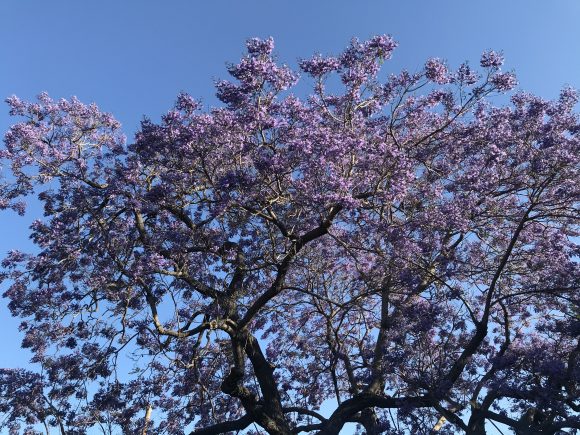What If We are not at War, but Discovering? by Dean Gail Stearns
May 15, 2020
 The Jacaranda trees are in stunning bloom right now near the Chapman campus. Every year their flowering purple display takes me by surprise. Throughout much of the year these majestic trees are rather unremarkable, and easy to pass by unnoticed. They are a poignant reminder of the need for respite, for dormancy, before the spring bloom. Even more stark, I sometimes think about the Jack Pine tree, a scruffy tree that grows in forests in the northern Midwest. Many years ago I was startled to learn a pine cone from the Jack Pine will not ordinarily open and release its seeds, unless it experiences heat as intense as fire.
The Jacaranda trees are in stunning bloom right now near the Chapman campus. Every year their flowering purple display takes me by surprise. Throughout much of the year these majestic trees are rather unremarkable, and easy to pass by unnoticed. They are a poignant reminder of the need for respite, for dormancy, before the spring bloom. Even more stark, I sometimes think about the Jack Pine tree, a scruffy tree that grows in forests in the northern Midwest. Many years ago I was startled to learn a pine cone from the Jack Pine will not ordinarily open and release its seeds, unless it experiences heat as intense as fire.
What if we need fire to open up too? Or at least need a period of dormancy? I’ve had a number of people say to me, even those who are having a difficult time in the face of the disruption of COVID-19, that they want to believe we have much to learn from this pandemic. They want to embrace this time of respite as though they truly needed it. But it feels callous and downright uncaring to say so.
I’m worried about either/or thinking right now, though. If one realizes they need this respite, does that mean they think this pandemic was meant to be, or a good thing? I’m always suspicious of theology or politics that declare bad things are meant to be and deserved, and that some people need to just endure them. The reason I’m suspicious is that historically, the ones declaring others should just buck up are usually themselves in positions of privilege, benefiting from the convenient labor of the marginalized who, they insist, have to just endure.
I’m worried we will divide even more into “us” and “them” if we see this as an either/or experience. If we simplistically, and falsely, divide people into those who want the economy to return to normal, and those who don’t. Or into those who want to save more lives, and those who don’t. Or if we judge one another based solely upon how close we stand to one another, or whether or not we don a mask. The last thing we need is another false way to judge people that might lead to violence, layered atop the serious prejudice built into systematic injustice, like that based upon race, that we desperately still need to unpack in our society.
Saying there is much to learn from this pandemic or that it may change humankind or society for the better, is not the same as saying this was meant to be. Acknowledging that people can grow through suffering is not the same as saying it is deserved. Saying that dormancy is something we sometimes need even if it’s forced upon us, is not the same as saying we wish for a pandemic just so we can slow down.
I truly believe we will learn from this, and as was suggested in one of Chapman’s “Ask the Experts” virtual townhalls, we may experience a renaissance of knowledge following this pandemic. Researchers from every field at the university have interrupted their ongoing projects to collaborate with colleagues world-wide and seek solutions in this unprecedented time. That gives me hope.
We did not ask for this respite, or this suffering. But that doesn’t mean we have to see it as a battle with only two sides, and only two ways to understand it. What if we looked at it another way? I offer you this poem excerpt with permission from Clinical Pastoral Educator, Miguel Santamaria.
What if we are not at war with an invisible enemy
but rather discovering a deeper need to be friends with everyone
What if we are not fighting a pandemic
but facing a virus that leaves us feeling vulnerable like never before
What if we are not determined to kill this virus
but rather putting minds together across the globe for a common cause
What if we are not deploying our teams to the frontlines
but rather praying in awe for our colleagues who are at the bedside
What if we are not winning when someone recovers from this virus
but rather celebrating with gratitude for the gift of healing
What if we people who die are not losing this fight
but rather dying under remarkable care and compassion
What if we are not trying to beat COVID-19
but, once again, discover a new way to care for our human race?
